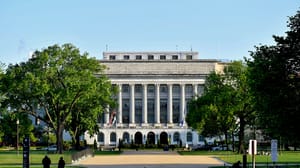Some Talking Points On Horse Slaughter
United Organizations of the Horse (unitedorgsofthehorse.org/) is a nonprofit educational and charitable organization providing accurate and timely info about the unintended consequences of bans on equine processing in the U.S. The group’s aims are to restore humane and regulated horse slaughter in the U.S., and control the overpopulation of wild and feral horses on federal, state, tribal and private lands.
May 7, 2010

United Organizations of the Horse (unitedorgsofthehorse.org/) is a nonprofit educational and charitable organization providing accurate and timely info about the unintended consequences of bans on equine processing in the U.S. The group’s aims are to restore humane and regulated horse slaughter in the U.S., and control the overpopulation of wild and feral horses on federal, state, tribal and private lands.
The group provides these points on the horse-slaughter issue:
Horse owners and people who make all or part of our living with horses are the people who care about horses. They clean the stalls, pay the feed bills and are responsible for the care of their animals.
There are fates far worse than slaughter. A quick, painless death in a slaughter plant is far preferable to a slow and agonizing death of starvation. Death in the wild is often brutal, prolonged and horrific.
Without the option of slaughter and use of the meat, those who can no longer afford to keep a horse, and can’t sell it, have literally no option – you can't bury a 1,000-lb. horse in the backyard like a cat or a dog.
Some Americans always have and always will eat horse meat. In fact, it was on the menu at the dining room at Harvard until the late 1980s, and you can still find horse sausage in Scandinavian butcher shops in the Upper Midwest; 72% of world cultures consider it just another protein source.
All animals, including horses, take nature that humans can’t use and turn it into nature we can use.
People have a right to use animals, and a responsibility to do so humanely. We believe all animals are sacred and must be harvested with dignity and gratitude, but the most horrific crime is to waste their sacrifice. Contrast that viewpoint with the total waste of at least 200,000 horse carcasses/year, which become a colossal disposal problem.
One billion people on Earth today are hungry, and another billion don’t get enough protein and nutrients for health. In addition, 10 million children/year die of starvation. From a moral standpoint, can we afford to put any viable protein source off limits?
Because of the closure of the U.S. slaughter plants in 2007 by state action in Illinois and Texas, the entire horse industry has been decimated. A $1.2-billion industry supporting 460,000 full-time direct jobs and another 1.6 million indirect jobs has been cut in half.
The animal rights radical agenda offers no viable solution, creating only a mechanism to shovel taxpayer dollars directly into the pockets of animal rights organizations. The ultimate goal of these groups is to end all human use of animals.
-- unitedorgsofthehorse.org/
You May Also Like



